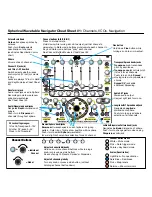
The Parameter ID indicates the parameter type. When transferring parameters (see “V Parameter
List” below) individually (as opposed to bulk transfer), this field is used to identify the parameter being
transferred by its parameter ID.
16.3.11
idx
: Data Index Number
Format:
LSB
0iiiiiiiB
MSB
0jjjjjjjB
The data index number indicates the first array number of the array from which transfer starts.
16.3.12
len
: Data Length
Format:
LSB
0lllllllB
MSB
0mmmmmmmB
As shown below, the meaning of this field differs depending on whether an individual transfer or a
bulk parameter set transfer is being performed.
Individual Parameter Transfer
The value of this field specifies the size of the parameter value
stored in the data field. Data length indicates the length of the array being transferred minus 1 when
the parameter contains a character string or other similar array structure.
Bulk Parameter Set Transfer
The value of this field specifies the size of the parameter set memory
image stored in the img field. Data length indicates the number of bytes of data included within a packet.
When this value is zero, it means the data itself does not exist.
16.3.13
data
: Parameter Data
Individual Parameter Transfer
Format:
index0
0dddddddB (0eeeeeeeB) (0fffffffB) (0gggggggB) (0hhhhhhhB)
index1
0dddddddB (0eeeeeeeB) (0fffffffB) (0gggggggB) (0hhhhhhhB)
index2
0dddddddB (0eeeeeeeB) (0fffffffB) (0gggggggB) (0hhhhhhhB)
:
:
indexN
0dddddddB (0eeeeeeeB) (0fffffffB) (0gggggggB) (0hhhhhhhB)
Parameter data indicates the parameter value. Data is repeatedly placed in an array of the size equiv-
alent to len+1. For the structure of one data item, the length depends on the data bit width(Parameter
List Size), as shown below.
Size
Number of Data
1 - 7
1
8 - 14
2
15 - 21
3
22 - 28
4
29 - 32
5
Each block of data is packed from the lowest order byte first. In the case of multiple-byte data, the
lowest weighted bit is the least significant digit of the first data byte, and the highest weighted bit is
the most significant digit of the final data byte. The following shows an example of how data would be
divided for transfer in the case of 32-bit data.
49






































